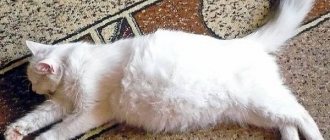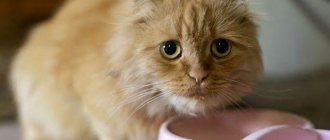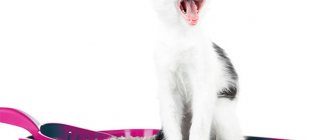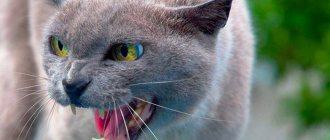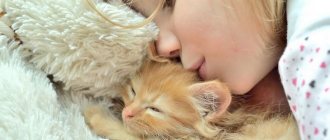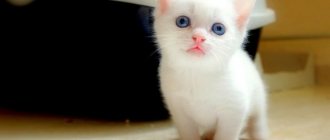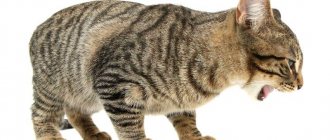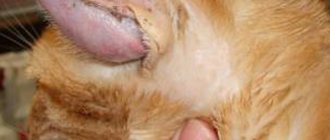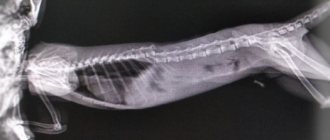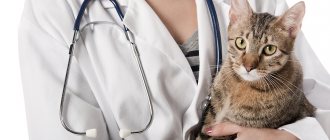Diarrhea in a kitten requires slightly different treatment than in adult cats, and besides, the animal’s immune system is not yet formed, which must also be taken into account. Do you want to know why kittens get an upset stomach and how to treat this condition? Then be sure to read this article to the end! There is a lot of useful and interesting things for all owners of these furry little balls. Remember that with diarrhea, self-medication is strictly unacceptable.
Diarrhea in a kitten: causes
There are many reasons for diarrhea in kittens Even mild stress can lead to diarrhea, which causes significant discomfort.
- Possible reasons why a kitten has diarrhea:
- Fatty foods, unsuitable food - all this can cause stool upset.
- Cats, as a rule, love to lick themselves; they are quite clean. However, this behavior can lead to parasite infestation.
- These bacteria can also be found in raw meat or fish.
- Diarrhea in a kitten can also be provoked by severe stress, for example, a visit to a veterinary clinic, or moving to a country house or another place of residence.
- Poisoning or eating low-quality food can also cause distress in a one-month-old kitten.
- Long-term treatment with antibiotics also disrupts the animal’s intestinal microflora.
- Feeding raw meat products can cause diarrhea with mucus in a kitten. And salmonella, which is contained in meat products that have not been heat treated, can enter the body. As a rule, such bacteria pose a fairly serious threat to the fragile animal’s body.
- If a kitten has bloody diarrhea, this is a direct threat to the life and health of the animal. Not only does dehydration occur due to blood loss, but the body also loses many useful substances that are washed out through feces.
- Diarrhea can also occur due to a sudden change in climatic conditions. Let's say you decide to relax and take your animal with you on a trip. At such a tender age, you should not allow such stressful situations.
- Changing food can also cause diarrhea and diarrhea. For example, if the breeder fed the baby natural food, then in this case you should not suddenly switch him to drying, no matter how impatient you are. Do it gradually.
However, the true cause of diarrhea cannot always be determined.
. And in this case, you have to deal with such unpleasant symptoms as frequent loose stools and pain in the stomach. The kitten seems to be hunching over, trying to get rid of unpleasant sensations.
Diarrhea in a kitten: color of feces
During an intestinal disorder, you should also pay attention to the color of feces. This will help you find out what actually caused the disorder.
- What color can a kitten have diarrhea and what does it mean:
- The color of the stool is black and even mixed with blood? This can mean a wide variety of serious diseases, such as panleukopenia or enteritis. Such conditions should never be treated without a veterinarian.
- A yellow tint of diarrhea may indicate dysbacteriosis or inflammation of the stomach.
- Green diarrhea with a putrid odor, coupled with fever, may mean the development of putrefactive microflora. In this case, you need to call a doctor at home as soon as possible and not waste precious time searching for information on the request: “The kitten has diarrhea, what should I do?” It is possible that the data may be inaccurate.
When calling a doctor at home, be prepared to inform the dispatcher about the color of the stool. This is very important for making the correct diagnosis, as well as choosing treatment tactics. For a speedy recovery, the owner needs to monitor his pet throughout the day, remembering the consistency of the stool, as well as the pet’s behavior at the moment.
Causes of bloody diarrhea
Diarrhea is a defense mechanism of the body in which toxins and foreign substances are evacuated from the intestinal lumen. Diarrhea is a common symptom that occurs with many diseases:
- the transition to an adult diet is too fast for a kitten;
- sudden transition to dry rations;
- quick inclusion of a new product in the diet;
- sudden change in diet;
- overfeeding;
- allergies to medications;
- severe stress;
- food allergies;
- viral infections;
- bacterial infections;
- helminthic infestation;
- kidney and liver diseases;
- hyperthyroidism;
- intestinal obstruction;
- bowel cancer;
- diabetes.
As you can see, diarrhea indicates many diseases, but the presence of blood in the stool is much less common. Blood can enter the intestinal lumen in several ways:
- Violation of vascular permeability. This pathology occurs in some viral diseases (they are rare), as well as in poisoning with pesticides. Microscopic hemorrhages in this case will be on many mucous membranes, and not just in the intestines.
- Erosion, intestinal ulcers, microcracks. This type of damage occurs in most cases. The culprit may be worms, a stomach ulcer (due to stress), a foreign body in the intestinal lumen,
- Intestinal perforation. In this case, the integrity of the gastrointestinal tract is disrupted, and a large amount of blood is released into the intestinal lumen. In such a situation, the greatest danger is not the cause, but the hole itself, since through it the animal can lose a lot of blood and die from it.
It should be remembered that when blood leaves the stomach or small intestine, the stool turns red as the hemoglobin has time to be digested. Blood itself, in the form of streaks or liquid, will be found in the stool if bleeding is observed in the large intestine or in the last parts of the small intestine.
Is diet important in treating a symptom like diarrhea in a kitten?
Diarrhea in a kitten is a consequence of a disorder of the gastrointestinal tract . In this regard, you simply need a healthy diet with certain restrictions, which will help normalize the functioning of the stomach and intestines as a whole.
- Basic nutrition principlesif the kitten had diarrhea:
- Eliminate fermented milk products from your diet.
- Do not feed from the common table.
- Feed only fresh foods.
- Feed with boiled chicken and rice, you can solder the rice solution, it has a strengthening property.
- To avoid dehydration, you can also give your four-legged friend any medications that will help prevent this. For example, magnesium sulfate or just drinking plenty of fluids.
However, remember that if a kitten has bloody diarrhea , diet alone will not get rid of it. Serious research from professional doctors will be required
. It should be remembered that kittens are weaker than adult animals, and therefore it makes sense to seek medical help as soon as possible.
- There are several reasons why you should definitely contact a veterinarian for help:
- The first argument is competent doctors.
- The second argument is the possibility of a specialist visiting your home, which is very valuable when a kitten at the age of 2 months has diarrhea. A trip to the veterinary center would be unnecessary stress for him, which is now completely unnecessary for the pet.
- The third argument is the professional approach of doctors to their work.
Therapy
Bloody diarrhea in cats should be treated by a veterinarian, as the animal may require urgent surgical care or intravenous injections.
The general principles of therapy are:
- diet;
- preventing dehydration with intravenous or subcutaneous injections of Ringer's solution with glucose;
- maintaining heart function (caffeine benzoate, cordiamine);
- mechanical washing out of pathogens (in infectious processes) using enemas with decoctions of oak bark and chamomile;
- prevention of bleeding with Vikasol (Dicinone, Etamsylate).
Is it possible to be treated at home?
At home, treatment for bloody diarrhea consists of following a course of therapy prescribed by a veterinarian, as well as following a strict diet. The following foods are excluded from the diet:
- raw meat and fish;
- salted, fried, smoked foods;
- sweets;
- confectionery and bakery products;
- ready-made food below super premium class;
- whole milk, sour cream;
- canned food intended for human consumption;
- cabbage, potatoes, beets.
Important! In some cases, a specialist prescribes a starvation diet. However, it is worth remembering that cats must receive water in the required quantity.
Specialized treatment
Principles of specific therapy for bloody diarrhea depending on the pathology:
| Pathologies | Treatment |
| Viral diseases | Immunostimulants, antibiotics (to prevent the development of bacterial pathogenic microflora) |
| Helminthiasis | Complex anthelmintics, destruction of ectoparasites |
| Poisoning | Sorbents |
| Non-infectious gastrointestinal pathologies | Feeding adjustments |
| Bacterial diseases | Antibiotics |
| Malignant tumors | Surgical removal of tumors, chemotherapy |
| Foreign bodies | Surgical extraction |
| Injuries | Surgical methods |
| Coccidiosis | Coccidiostats, sulfa drugs |
Despite the existence of general principles of therapy, treatment is selected by a veterinary specialist individually for each specific case.
Doctors on the staff of “I-VET” to answer why a kitten has diarrhea and in other situations
The veterinary is one of the few in the capital that can boast of having highly specialized specialists. We have the following professionals in our arsenal:
- gastroenterologist;
- dentist;
- gynecologist for dogs and cats;
- ratologist;
- ophthalmologist;
- neurologist;
- nephrologist;
- many other specialists who are ready to help with the most exotic animals that can only exist on our planet.
Such a variety of specialists will allow you to receive first-class assistance at any time. Even if you call us late at night, specialists will arrive promptly, within 40 minutes maximum, and help solve all problems related to your pet’s health as quickly as possible.
Many consider calling a veterinarian to your home a fad for the rich, however, for example, with diarrhea, this can be an invaluable help that will help quickly, easily and safely for others to help your pet.
Features of the disease
Diarrhea is the rapid evacuation of intestinal contents without proper absorption. At the same time, the number of bowel movements increases to 4 or more times a day, the masses acquire a liquid state.
Such disorders entail dehydration, which can cause lethargy, decreased activity, lack of appetite, etc. In the absence of proper treatment, water and electrolytes are washed out of the body, leading to a serious imbalance and death of the pet.
Bloody diarrhea in cats is a sign of serious damage to the digestive tract. Blood streaks and clots, remnants of undigested food, and worms may be passed along with the stool.
If blood appears in your pet's stool, you must immediately seek help from a veterinarian to diagnose and treat the problem and prevent complications.
Diarrhea in a kitten: what to do before the doctor arrives
- First of all, do not give your kitten serious medications, for example, painkillers, which can only disrupt the overall picture of the disease.
- Do not disturb the kitten or play with it against its will. Be extremely careful with him.
- Clearly explain to your household that it is better to leave the animal alone, it is already unwell.
- Do not give forbidden food, no matter how the kitten asks, however, it is quite possible that he will not have an appetite at the moment.
- Since veterinary care will be provided at home, you should be prepared for different situations and prepare the premises for the doctor's arrival.
- The doctor knows better what tests and procedures should be done. Therefore, the owner is recommended to know the address of the nearest pharmacy, both human and for animals, where he can buy all the necessary things and medicines.
If your cat has water diarrhea
The causes of stool abnormalities are judged, among other things, by the consistency and color of the stool. Watery discharge usually occurs suddenly and goes away on its own. The acute form of the pathology is often caused by poor-quality food or drink. Some cats do not tolerate milk well.
The pet is given boiled water and food is reduced. Food is completely excluded from the table. If after 2 days the condition does not improve, blood is observed in the stool, and the animal begins vomiting, then a veterinary examination is necessary.
If your cat has white diarrhea
A light shade indicates serious problems with the gallbladder or liver. A diseased gland secretes an insufficient amount of bile. The danger is that bile helps digest semi-saturated fats. Their deficiency leads to the development of various diseases.
Diseases causing disturbances in bile secretion:
- hepatitis;
- cholangitis;
- cirrhosis;
- atony of the gallbladder.
The doctor identifies the pathology and prescribes treatment.
Treating a cat for diarrhea at home
“Home” therapy can only be carried out under certain conditions:
- absence of blood, mucus in feces, does not acquire green or other uncharacteristic tint;
- the pet has a relatively normal appetite;
- Vomiting and aggressiveness are not observed.
Be sure to read:
A cat is vomiting yellow liquid: normal or pathological, first aid, what to do, best medications, diet
The animal is given absorbents: Smecta, activated carbon. To prevent dehydration, split drinks are prescribed: boiled water / rehydron solution. Antidiarrheals and antibiotics are prescribed by the doctor.
How to help a kitten at home
Proper first aid is very important to avoid further harm to your pet:
- We place the kitten in a calm, warm place.
- We do not feed under any circumstances, even if there is an appetite.
- It is allowed to give water if the animal drinks on its own.
- We do not give any medications without consulting a veterinarian.
- We collect stool for laboratory analysis - this will help significantly speed up diagnosis.
- We take the animal to the clinic - the sooner the better.
What is diarrhea
This is a symptom of various diseases in which disorders of the stomach/intestines are diagnosed. It appears as liquid frequent bowel movements, with the possible presence of various inclusions.
In many diseases, diarrhea (diarrhea) is a protective reaction of the body, helping it remove toxins and foreign harmful substances from the intestines.
Diarrhea often causes pain in kittens and is accompanied by vomiting, loss of appetite, and lethargy. Long-lasting and incessant, it can be dangerous not only to the health, but also to the life of the kitten’s fragile body.
With liquid bowel movements, dehydration develops - substances that are extremely important for the normal functioning of the entire body (calcium, sodium, potassium) are lost. This causes a serious imbalance in the functioning of the organs.
Severe dehydration can even lead to cardiac arrest.
Normally, in older kittens, the feces should be dark brown in color, shaped like short tubes. A healthy animal defecates 1-2 times a day, sometimes three times a day. Very young kittens may pass unformed, pasty, light brown feces.
This, in the absence of other pathological symptoms, is considered normal and is associated with feeding habits (the diet contains a large amount of mother's milk).
You can talk about diarrhea if the kitten goes to the potty too often. In this case, the feces are liquid or semi-liquid, containing mucus, blood, and other foreign inclusions.
List of medications for treating diarrhea
There is a list of the most popular medications for the treatment of diarrhea in cats:
- Smecta. A well-established medicine against diarrhea. Smecta can be given to a kitten only in the initial stages of diseases of the digestive system. The dosage of Smecta should be selected based on the weight and age of the pet.
- Polysorb is also good.
- Most often, veterinarians prescribe Phthalazol.
- Activated carbon. It is allowed if the animal only has diarrhea without additional symptoms.
- When using Loperamide, the dose should be the minimum. Tablets are not the most suitable medication for cats. It should be given with great caution.
- Enterosgel for kittens against diarrhea is approved; it helps cleanse the body.
- Antibiotics are prescribed only as prescribed by a doctor.
- Enterofuril for kittens with diarrhea is able to cope with the disease in the shortest possible time.
- Furazolidone is prescribed for kittens for diarrhea without a veterinarian's prescription.
- Bifidumbacterin is prescribed for such ailments quite often.
- Levomycetin should always be in your home medicine cabinet in case of diarrhea.
In addition to the above-mentioned medications, cats are additionally prescribed probiotics.
Treatment at home
You should treat your cat yourself only if the signs of the disease do not cause concern for the health and life of the baby. Regular activated charcoal can be given as a simple treatment for diarrhea. In addition, folk remedies can also stop diarrhea.
In what cases is the help of a veterinarian necessary?
It happens that treatment of diarrhea does not give the desired result or there are additional elements in the discharge, and the pet’s condition has worsened. It is worth taking the cat to the veterinarian to avoid further harm to the animal.
If results after home treatment do not appear the next day, you should go to the veterinarian. If necessary, the baby is given a blood test.
If your cat has yellow diarrhea
The color of excrement is affected by bilirubin, which is part of bile. It is secreted by the liver and from there it enters the intestines. In the colon it is oxidized to stercobilin, which gives dark color to stool.
Disturbances in the oxidative process may be associated with dysbiosis caused by poor nutrition. Overfeeding an animal or heavy food puts stress on the liver, impairing its function. The gland secretes excess amounts of bilirubin.
The body eliminates excess in undigested form. Liver dysfunction can be caused by pathologies: hepatitis, pancreatitis.
What to feed a cat with diarrhea
Diarrhea is dangerous due to dehydration. They give the animal water and make sure the cat drinks. If the pet refuses, give it by force from a spoon or syringe.
An intestinal disorder requires changes in your furry friend's diet:
- high-quality, easily digestible foods to reduce the burden on the digestive system;
- to reduce the risk of an allergic reaction, limit protein intake;
- during therapy, exclude milk, raw meat, fish;
- provide probiotics that improve intestinal microflora and stimulate the growth of beneficial bacteria;
- To improve digestion and maintain water balance, it is recommended to replace dry food with canned liquid food.
Carefully monitor the reaction. For any abnormal symptoms, consult a doctor.
Causes
The most common cause of problems with the digestive tract is a change in the cat's usual diet. If frequent bowel movements occurred during the introduction of changes in diet, we can say with confidence that the cause of the disease lies precisely in this. In this case, indigestion can be cured without special therapy. All you need to do is return to your usual food. However, the causes of digestive disorders in cats are not limited only to errors in nutrition; a number of household factors can provoke a painful condition:
- unbalanced diet - the presence in the pet’s diet of raw fish, dairy products, fatty foods, which can cause digestive problems;
- too large portions or frequent feeding;
- transition from natural food to special food or vice versa;
- low-quality water, a change in its usual composition can affect the functioning of the gastrointestinal tract;
- food poisoning: a pet may suffer from consuming spoiled food that has expired;
- individual intolerance to any product, allergies;
- dysfunction of the digestive tract can be caused by medications; manufacturers of veterinary drugs often list diarrhea in the list of side effects;
- postoperative period;
- postpartum rehabilitation and the period of gestation are also often accompanied by gastrointestinal disorders.
Frequent urges to defecate may be caused by an unstable emotional state of the cat. An experienced stressful situation, unfavorable home conditions, excitement, fear, the appearance of other pets in the house, long-term separation from the owner, the arrival of guests, or moving can cause diarrhea. These factors should not be a cause for concern; usually, special treatment is not required, the pet recovers on its own immediately after the disappearance of the traumatic factor.
At the same time, the cause of diarrhea with blood in a pet (or without bloody discharge) may lie in the presence of life-threatening diseases:
- salmonellosis, E. coli infection and other bacterial infections;
- diarrhea and vomiting in a cat with white foam can be caused by viral diseases, including the so-called feline leukemia, rotavirus, panleukopenia, etc.;
- the causes of green diarrhea in a pet can be a consequence of various liver diseases, including pancreatitis;
- diarrhea in cats is caused by pathologies of the digestive system of various etiologies, including partial or complete intestinal obstruction;
- intoxication of the body that developed as a result of complex drug therapy or caused by severe poisoning;
- metabolic disorders, including diabetes;
- parasitic lesions of the body - roundworms, helminthic infestations, worms;
- oncology;
- pathologies of the urinary system;
- fungal infections (mycoses).
Separately, it is worth noting the causes of vomiting with white foam with frequent acts of defecation; their nature is most often physiological, thus the pet independently gets rid of undigested food and toxins. In the absence of accompanying symptoms that aggravate the animal’s health, special treatment is not necessary.
The kitten has a bloated belly and diarrhea
Bloating with diarrhea is formed due to flatulence, less often due to overeating. This combination is caused by errors in the preparation of the kitten’s diet, which needs to be fed properly. Tender stomachs simply cannot digest adult food! As a result, food accumulation occurs, indigestion leading to diarrhea, flatulence and vitamin deficiency.
Worms also cause bloating; if deworming is not carried out, then this is the first thing that should come to the owner’s mind. If they exist, and the animal is not spared from such “neighbors,” then the death of the baby is quite likely. It is better to carefully study the material about parasites in cats and kittens, and not return to this problem.
If the kitten's tummy is swollen, it is better to go to the veterinarian, who will rule out serious illnesses and advise about loose stools.
What to do
If the cause is overeating, then it is important to adjust the diet itself and the portion size.
When the cause is parasites, then such a baby needs a certain dose of medication, and it should be agreed upon after examination at a veterinary clinic with a specialist. Self-treatment is fraught with violations in dosage and incorrect approach to the treatment regimen.
Flatulence appears as the kitten grows; if the diet is improved, the problem will quickly go away. The combination of loose stools and flatulence is painful; it is better to help the baby with activated carbon or enterosgel, while reviewing the diet. The coal tablet should be cut into 4 parts and mixed with water.
Medicines and dosage for diarrhea in cats
Drug therapy is prescribed by a veterinarian.
| name of the drug | pharmachologic effect | dosage |
| Lignitin (tablets) | absorbent, antidiarrheal | table/2 kg weight, 7-10 days |
| Loperamide (tablets) | antidiarrheal | 0.5 mg/0.4 kg body weight, every 8 hours |
| Enterofuril (suspension) | broad spectrum antimicrobial | 1 ml/2.5 kg, no more than 5 days |
| Furazolidone | synthetic antibiotic | the diagram is signed by a veterinarian |
| Phthalazole | Anti-inflammatory, antibacterial | the dosage is determined by the doctor |
| EnteroZoo (paste) | detoxification | 2 tsp / 2 kg |
To restore the microflora, they follow a diet and give bifidobacteria and lactobacilli.
The kitten has yellow diarrhea
If the diarrhea is yellow in color, then the kitten’s feces move too quickly towards the exit, but there may be enough reasons for this, namely the presence of:
- infections;
- worms;
- allergies;
- lactose intolerance.
Normally, bile with yellow bilirubin should enter the intestines. As stool passes through the intestines, digestive enzymes cause bilirubin to turn into brown stercobilin. With diarrhea, peristalsis is disrupted and increased, so the transformation process does not occur.
In addition, the kitten may have jaundice, in which case there is too much bilirubin in the stool, which is why it is yellow.
How to treat
Here's how to help a child with diarrhea of this color: first you should take a blood test and check the liver. At the same time, the cat’s diet is adjusted to normalize stool quality.
Kittens are not allowed out of care at first, because this causes dehydration, which can end in the most disastrous way. The water should be nearby, clean and fresh! Drink only boiled water to avoid the development of secondary infection.
Each act of defecation should end with washing the base of the tail with soapy warm water - bilirubin can irritate the skin. And if helminths are added to everything, then in this way the owner washes off their eggs.
If you are overfeeding your cat, you can add pumpkin puree to the food, the dosage is a teaspoon, three times a day.
Vaccinations for diarrhea cannot be carried out, even if the calendar date has come!
